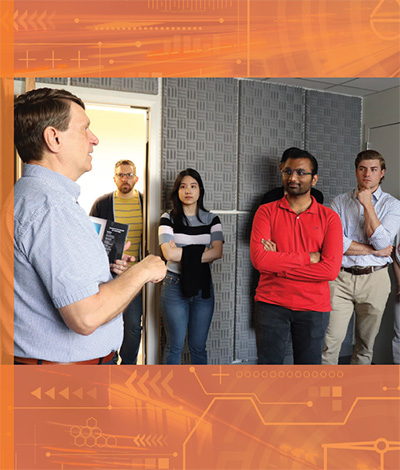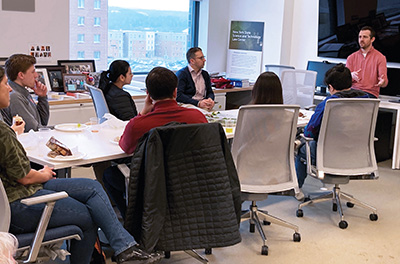At the Innovation Law Center (ILC), creating student opportunities is the primary metric for measuring success, according to Executive Director and Professor of Practice, Brian J. Gerling, L’99 . ILC students prepare reports for entrepreneurs developing new technologies and assist with their commercialization goals. The ILC creates valuable experiential learning opportunities that lead to job success for graduates of the Center. Recently Bloomberg Law recognized this success by identifying the ILC as a top program for Innovation and Experience. This success creates opportunities for students and helps drive the ILC’s mission of not only providing its students with a well-rounded education but also local, regional, and national economic development through support for technological innovation.

The Importance of the Innovation Law Center’s Mission
The ILC provides access to legal research and commercialization knowledge to entrepreneurial inventors in the community. The importance of this type of early-stage due diligence cannot be overstated. Students at the ILC research various intellectual property protections, market information, the regulatory landscape, and the corporate or legal structure of the entity on behalf of inventors. Generally, entrepreneurial inventors will develop their technologies over months or years before determining if they are capable of intellectual property protection or if the technology will have a market. The ILC process can help significantly speed up this timeframe.
To receive a patent, an invention must be of eligible subject matter, useful, novel, and non-obvious. While the eligible subject matter and usefulness requirements are typically easy to meet, the novelty and non-obvious sections can often be difficult to satisfy because of, for instance, competitor patents in the field. These outcomes can sometimes turn on subtle technological differences.
While the ILC does not practice law, an ILC report helps the entrepreneur decide early in the process if they want to continue developing their idea, or if they need to pivot because their invention has patent challenges. The report provides an in-depth analysis of the prior art—publicly available information that predates the client’s invention—to help the entrepreneur navigate such obstacles. It also helps the client decide if a patent is the appropriate goal for protecting their intellectual property. Perhaps other IP options like Copyright, Trademark, or Trade Secret protection are better avenues for protecting a particular technology. And if a particular technology is regulated, the report will outline the applicable regulatory process for the invention and also discuss possible licensing options. These determinations potentially save years of development time and money. Equally important to the entrepreneur is that the report guides the early-stage inventor on how to bring an invention to the market. In addition to discussing a path for securing intellectual property protection for a given technology, the report provides a complete market research section that facilitates the best market strategies to commercialize the technology.
For instance, Joe Caspar and Chris Nolan, co-founders of M3 Innovations, a lighting technology company, recently praised the ILC by saying,
“Working with the Innovation Law Center has really helped our company grow significantly. We struggled when we started. There are some challenges with intellectual property: it’s a slow process; it translates to a huge expense; and it can be difficult to defend. [We partnered with the] ILC last summer, and we can’t say enough good things about it. It was a huge success. The students had a broader perspective that made filing the patent much faster. This is the most fast-track patent we ever filed, and it’s a stronger patent. We were able to secure a purchase order of $709,000 almost immediately because of the work of the Innovation Law Center.”
Joe Caspar and Chris Nolan, co-founders of M3 Innovations
The Essential Work of the Innovation Law Center Is Recognized
Bloomberg Law recently recognized the College of Law’s ILC program as one of the top 10 legal programs for Innovation and Experience. This category identifies legal programs that advance new approaches to student instruction, legal technology, experiential learning, and advancing other areas of legal education. The ILC program competed with the likes of Stanford Law, Duke Law, and other peer schools, and was recognized for its innovative approach to law school pedagogy.
“The College of Law is honored to be recognized by Bloomberg Law in the field of legal experiential education,” said College of Law Dean Craig M. Boise in acknowledging the accolades. “The Innovation Law Center pioneered the educational field of technology commercialization law 30 years ago and continues to expand educational options and opportunities for its students and deliver vital research to its clients.”
More recognition comes from the success the ILC has in working with various partners. For example, the ILC is the only designated New York State Science & Technology Law Center (NYS STLC) for the Empire State Development’s Division of Science, Technology, and Innovation (NYSTAR). The ILC is now in its fifth five-year grant cycle from NYSTAR indicating a long tradition of serving the innovation ecosystem in New York. These grants allow the ILC to serve as a state-wide resource to early-stage technology companies, and they, in turn, help fuel local and statewide growth of industry. The ILC further supports economic development in the community by publishing the Innovation Review, periodic newsletter, guidebooks, and by hosting and/or attending conferences promoting its customized research.
Nick Conn, Founder and Chief Scientific Officer of Casana, offered admiration for the ILC. “A resource like the ILC that provides early-stage research information and education to startups without charge is crucial research for early-stage companies seeking to commercialize a new technology in New York State. The faculty and students involved in the project exceeded our expectations, and the final research reports provided a good understanding of the prior art and regulatory landscapes. I am happy to report that Casana has achieved a number of promising commercialization milestones, including raising a $30m Series B round of funding in January of 2022.”
The Innovation Law Center is Growing Opportunities for Students
The ILC continues to add opportunities for students. The ILC has been developing a residency program for recently graduated law students to hone their knowledge of technology, law, and entrepreneurship. The residency program is designed to provide both academic opportunities and hands-on work experience. Further, Law 815, the primary class for students in the ILC, has more than doubled in size from 12 to 26 students. Additionally, the ILC hires many of its students into key ILC positions, such as Senior Research Associates, Special Project Consultants, and Summer Program positions, which further enhances the experiential learning students need to be successful.
Recently, the ILC partnered with the Martin J. Whitman School of Management (pictured below) to launch the Certificate of Advanced Studies in Technology Law and Entrepreneurship (“CASTLE”) program. The CASTLE program is recognized by New York State as a stand-alone educational certificate and integrates business, entrepreneurship, and law in a transdisciplinary approach to technology, entrepreneurship, and commercialization. The program serves as the connective tissue between business, science, engineering, and legal studies. It consists of a minimum of 12 credits, including a foundational course in entrepreneurship offered at the School of Management, while Law 815 is the capstone course at the College of Law. This CAS is another honor students can earn to better position themselves in the job market. Importantly, the opportunity is open not only to Law and Management students, but purposefully available to all graduate students and professional students at Syracuse University, State University of New York (SUNY) College of Environmental Science and Forestry, and SUNY Upstate Medical University, who seek to master the basics of the technology commercialization process and/or translational research.
The ILC is partnering with Syracuse University’s Office of Technology Transfer (OTT) to, among other things, develop a liaison program that will benefit law students and University faculty, alike. “Bringing the ILC and the OTT together will directly benefit the University by accelerating our technology transfer and commercialization processes and enabling law students to work with technologies and clients from within our campus,” says Duncan Brown, Vice President for Research at Syracuse University. The move allows Syracuse University to rely on the expertise, resources, and infrastructure of the ILC to more efficiently bring innovative technologies from development to the market.
The Innovation Law Center Measures Success on Student Outcomes
Unlike other law school courses that focus on traditional doctrinal legal training, the ILC provides valuable experiential learning opportunities that lead to job success. The ILC program provides students with the opportunity to hone the practical skills they will need to carry with them into their practice. It has a history of placing an extremely high percentage of the students that come through its doors with employers. Such employers include some of the top innovative companies that have worked with the ILC such as Welch Allyn (now Baxter Healthcare) and Regeneron, venture capital-backed companies such as Orange Grove Biosciences, as well as institutes of higher education such as SUNY Upstate Medical University, Clarkson University, and Cornell University. Recent graduate Chris Henley L’22 says, “Because of the experiences that I had in the ILC, I was hired at the Harvard-affiliated Children’s Hospital in Boston. All the questions they asked me during the interview were things I had learned and done in the Center.”
As a former student in the ILC program when it was the Technology Law Commercialization Program under its founder Professor Ted Hagelin, and now as the Executive Director, Professor Gerling can fondly remark,
“What is special about the ILC is two-fold. One, our clients benefit from important research and analysis that guides them through the critical early stages of the commercialization process and serves to mitigate risk. Our services benefit so many people and organizations throughout the innovation economy in New York state and across the country. And two, our students receive vital practical experience working with real clients who are looking for real solutions, and that experience positions them for success in the job market. The ILC’s high placement rate, reflecting our track record of converting student experiences into employment successes, is one of our proudest measures.”
Professor of Practice, Brian J. Gerling, L’99

